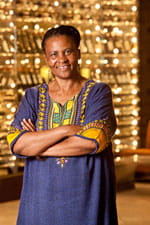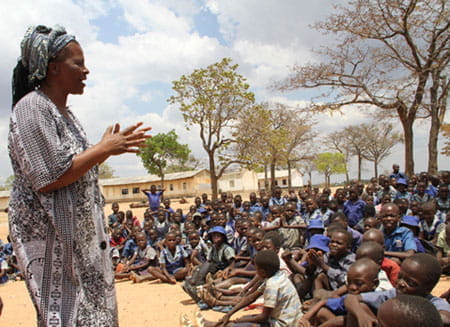Dr. Tererai Trent explains how she traveled from rural Zimbabwe to America to earn her bachelor’s, master’s, and doctorate—with five children in tow—and transformed herself into an advocate.

For Dr. Tererai Trent, it was never an option to toe the line. A child bride at age 11 and a mother of three by 18 in rural Zimbabwe, she knew she had to create educational opportunities for herself—and her children. As she explained in her spellbinding plenary speech to Walden students and faculty members in Atlanta, she traveled to America to earn her bachelor’s, master’s, and doctorate despite the challenges she faced. Today, the world-class speaker is making a powerful impact on her African community by building schools to share the educational opportunities she’s experienced. Read on to learn the details of her inspiring story:
WHEN DID YOU REALIZE IT WAS ESSENTIAL TO PURSUE YOUR EDUCATION?
TRENT My mother was so empowering. When I was growing up, she would say, “Education is the main pathway out of poverty.” I wanted to get an education because I realized that men and women who are educated earn a better life. If you achieve your dreams for an education, not only are you determining your future but also the future of your children and the community at large.
YOU BURIED A LIST OF YOUR GOALS IN THE GROUND WHEN YOU WERE YOUNG. WHAT WAS THE SYMBOLISM BEHIND THAT ACT?
TRENT I come from a culture where when a baby is born, the umbilical cord is buried around the hut with the belief that wherever you go, you will always come back to your roots. My mother wanted me to have something to believe in. She said, “When you bury your dreams, the rock will always remind you of the things that need to be achieved in your life.” My mother knew I needed a point of contact, something that can always remind me that I needed to achieve my dreams.
WHAT WAS ON YOUR LIST OF GOALS?
TRENT I wanted to come to America to get an education; I wanted to have a bachelor’s, a master’s, and a PhD I also wanted to come back to my country and improve the lives of women. My mother always said, “Your dreams will have greater meaning if they include the betterment of others.” I knew I had to give back to my community. As I achieved each dream, I realized I could not have done what I did without the power of others who believed in me.
HOW DID JO LUCK OF THE NONPROFIT HEIFER INTERNATIONAL INSPIRE YOU?
TRENT Jo Luck is an amazing individual. She made a big impression on me when she came to my village and sat on the floor with us and ate Bambara nuts. When she looked at me and said, “If you believe in your dreams, you can do it, it’s achievable,” I believed—I believed in her. I realized she is a true individual who believes in empowering others.
WHAT CHALLENGES DID YOU OVERCOME TO MEET YOUR EDUCATIONAL GOALS?
TRENT Coming to this country with five kids is not easy. As an international student, I didn’t have scholarships; I had to maintain three jobs and take care of my children. It was tough, but I knew the challenges were temporary.
WHAT ARE THE UNIVERSAL LESSONS YOU LEARNED WHILE PURSUING YOUR EDUCATION?
TRENT I learned about our interconnectedness as a global community. I learned that when I reach out to others, they are more willing to help me if they understand the desire behind what I need to achieve. I find it grounding that I’m not alone; we all have similar desires to live a healthy life, and we all face challenges. If we come together as a community, we are able to conquer some of these social ills. And that’s why I always say this is not only about Tererai; this story represents millions of women who also want to achieve their dreams.
WHEN TIMES WERE ESPECIALLY TOUGH, HOW DID YOU STAY MOTIVATED?
TRENT I knew I was the first one in my family to obtain a degree. I needed to break the vicious cycle of poverty in my own family. I also knew that if I achieved my education, I am defining the future of my own children. That kept me going. Education is the main pathway out of poverty.
WHAT DOES THE NAME OF YOUR ORGANIZATION, TINOGONA, MEAN?
TRENT Tinogona: It is achievable. When I met Jo Luck, she kept saying, “It is achievable to obtain your dreams for an education.” It drives me every day. It enables me to look at any challenge and say, “It’s temporary.” This challenge is not going to define who I am. I am the master of my own future. As long as I work hard and I believe in my dreams, I can achieve them.
WHAT ARE THE GOALS OF YOUR WORK AT TINOGONA?
TRENT We’re building schools. And it’s not only about mortar and bricks; we want to improve the quality of the education. I partner with Oprah Winfrey, and she connected me with the remarkable organization Save the Children. Almost 4,000 children and 125 teachers will benefit from this program. We have installed water at the schools. To witness water gushing out of a tap was a miracle. Kids spend most of their time going to the river to fetch water, and now the water is within the school where they can get it.
WHAT ADVICE WOULD YOU GIVE TO OUR ALUMNI?
TRENT We are interconnected as human beings. No one chose to be born in poverty. And no one chose to be born in a privileged family. That alone tells me that we need to reach out to others and give back. That’s what drives me. If we want to transform our communities and enable individuals to empower themselves, it is important to give voice to these issues. We all have a moral obligation to transform our communities.
WHY IS IT SO IMPORTANT TO SPEAK PUBLICLY?
TRENT In many ways we are opening dialogues; we are helping people understand these issues. It helps in terms of formulating policies, but most importantly, I think it also helps to energize and motivate individuals to say, “I can achieve my dreams; my past is not going to define who I am; my present situation is not going to determine my future. I can do it and also give back to my community.”
Watch the inspiring video of Dr. Tererai Trent’s story on “The Oprah Winfrey Show.”
Find your passion to volunteer—or discover new opportunities—by visiting www.WaldenU.edu/servicenetwork.




